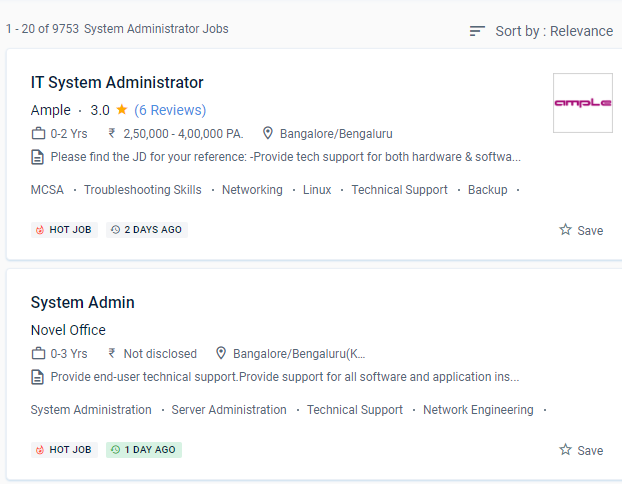System Administration Internship/Course Details


System administration roles are broad and often vary based on the type of computer system being managed, however, the majority of them have some fundamental functions that can be accomplished in a variety of ways. Network architects have frequently experienced administrators who build data transmission systems from the ground up. Information technology (IT) experts execute the work of systems administration for a company.
Large companies provide opportunities for system admins to advance through promotions. You'll also learn how to manage and configure servers, as well as how to manage PCs, user information, and user productivity using industry tools. Information security managers are given more duties when it comes to protecting sensitive data from hackers. Systems administration is the division of information technology that is in charge of keeping multi-user computer schemes up and running. Finally, you'll discover how to restore your company's IT infrastructure following a disaster.
When signals halt, system administrators alter cables to repair the transmission media.
A system administrator's responsibilities include the following:
System administrators are in charge of managing, maintaining, and configuring commercial computer systems on a day-to-day basis.






 System administration roles are broad and often vary based on the type of computer system being managed, however, the majority of them have some fundamental functions that can be accomplished in a variety of ways. Network architects have frequently experienced administrators who build data transmission systems from the ground up. Information technology (IT) experts execute the work of systems administration for a company.
Large companies provide opportunities for system admins to advance through promotions. You'll also learn how to manage and configure servers, as well as how to manage PCs, user information, and user productivity using industry tools. Information security managers are given more duties when it comes to protecting sensitive data from hackers. Systems administration is the division of information technology that is in charge of keeping multi-user computer schemes up and running. Finally, you'll discover how to restore your company's IT infrastructure following a disaster.
When signals halt, system administrators alter cables to repair the transmission media.
A system administrator's responsibilities include the following:
System administrators are in charge of managing, maintaining, and configuring commercial computer systems on a day-to-day basis.
System administration roles are broad and often vary based on the type of computer system being managed, however, the majority of them have some fundamental functions that can be accomplished in a variety of ways. Network architects have frequently experienced administrators who build data transmission systems from the ground up. Information technology (IT) experts execute the work of systems administration for a company.
Large companies provide opportunities for system admins to advance through promotions. You'll also learn how to manage and configure servers, as well as how to manage PCs, user information, and user productivity using industry tools. Information security managers are given more duties when it comes to protecting sensitive data from hackers. Systems administration is the division of information technology that is in charge of keeping multi-user computer schemes up and running. Finally, you'll discover how to restore your company's IT infrastructure following a disaster.
When signals halt, system administrators alter cables to repair the transmission media.
A system administrator's responsibilities include the following:
System administrators are in charge of managing, maintaining, and configuring commercial computer systems on a day-to-day basis.



















































































